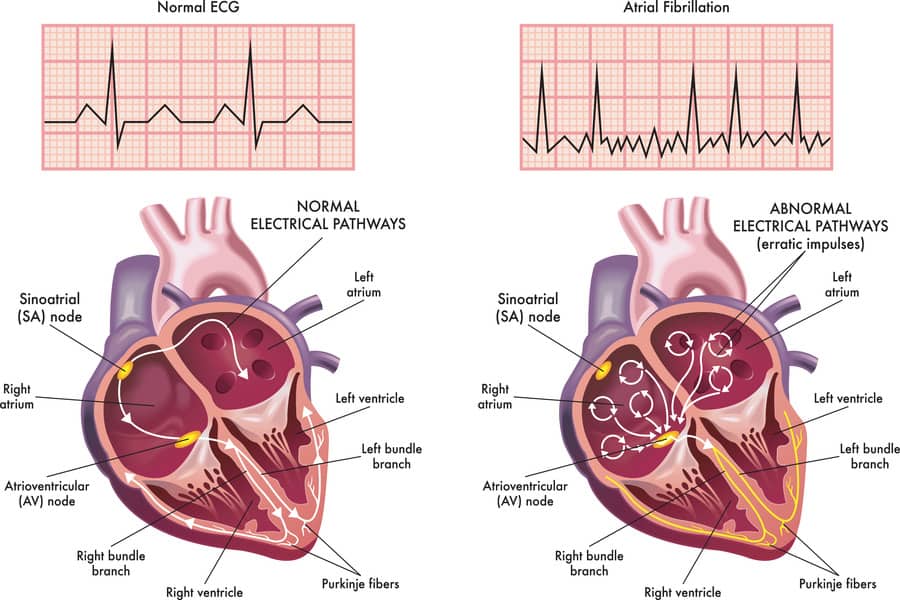Atrial fibrillation, commonly referred to as AFib or AF, is the most frequent type of serious arrhythmia. It affects millions of people worldwide, disrupting their quality of life and posing serious health risks. This comprehensive guide seeks to shed light on AFib, its origins, manifestations, and the treatments available.
Understanding Atrial Fibrillation
At its core, atrial fibrillation is a rapid, irregular heartbeat that can lead to stroke and other heart-related complications. It originates when the two upper chambers of the heart (the atria) beat chaotically and irregularly, out of coordination with the two lower chambers (the ventricles). This results in a malfunction in heart rhythm, which is evident when the heart’s electrical signals are recorded on an electrocardiogram.
Causes and Risk Factors
Multiple factors can increase the risk of AFib. These include:
- Age: The risk increases with age.
- Heart Disease: Conditions such as high blood pressure, coronary artery disease, and heart attacks can pave the way for AFib.
- Other Chronic Conditions: Thyroid problems, sleep apnea, and other medical issues can also trigger AFib.
- Excessive Alcohol Use: Binge drinking can put individuals at a higher risk.
- Family History: Having family members with AFib can increase the risk.
Symptoms of Atrial Fibrillation
While some people with AFib might have no symptoms, others may experience:
- Palpitations
- Weakness
- Fatigue
- Lightheadedness
- Confusion
- Shortness of breath
- Chest pain
- Dizziness
Some persons with atrial fibrillation (AFib) are asymptomatic.
Atrial fibrillation can be caused by:
- Paroxysmal atrial fibrillation occurs on occasion. AFib symptoms appear and disappear. The effects normally last a few minutes to several hours. Some people experience symptoms for up to a week. The events may occur repeatedly. Symptoms may resolve on their own. Some persons with sporadic AFib require treatment.
- Persistent. The erratic heartbeat remains unchanging. The cardiac beat does not automatically reset. If symptoms appear, medical attention is required to rectify the cardiac rhythm.
- Long-standing and unwavering. This type of AFib is continuous and lasts for more than a year. To repair the irregular heartbeat, medications or a procedure are required.
- Permanent. The abnormal cardiac beat cannot be reset in this type of atrial fibrillation. Medicines are required to regulate the heart rate and avoid blood clots.
Complications
AFib can lead to a range of complications. The most severe among them is the risk of stroke. Due to irregular heartbeats, blood can pool in the atria, forming clots. If a clot breaks off, enters the bloodstream, and lodges in an artery leading to the brain, a stroke can result.
Treatment Approaches
Treatment strategies for AFib often focus on resetting the rhythm or controlling the rate. They might include:
- Medications: Anti-arrhythmic drugs can be prescribed to restore or maintain a normal heart rhythm.
- Electrical Cardioversion: This involves ‘shocking’ the heart back into normal rhythm.
- Catheter Ablation: Using radiofrequency, cold temperatures, or lasers, the abnormal tissue causing AFib is destroyed.
- Surgery: Maze surgery involves creating a series of surgical incisions in the atria, which then heal into scars and form barriers electrically. This helps prevent the propagation of disordered electrical signals.
- Lifestyle changes: Maintaining a heart-healthy lifestyle can be key in preventing and managing AFib.
The Future of AFib Management
With the advancements in medical technology and research, the horizon is bright for those with AFib. Wearable tech now can monitor heart rhythms continuously, alerting individuals of irregularities, which can be life-saving. Moreover, new medications and non-invasive procedures are constantly being developed, offering hope to those grappling with this condition.
Atrial fibrillation is a complex condition that requires thorough understanding and management. It’s crucial for patients to work closely with their healthcare providers to determine the best course of action. Early detection and intervention can significantly improve the quality of life and prevent severe complications associated with AFib.









